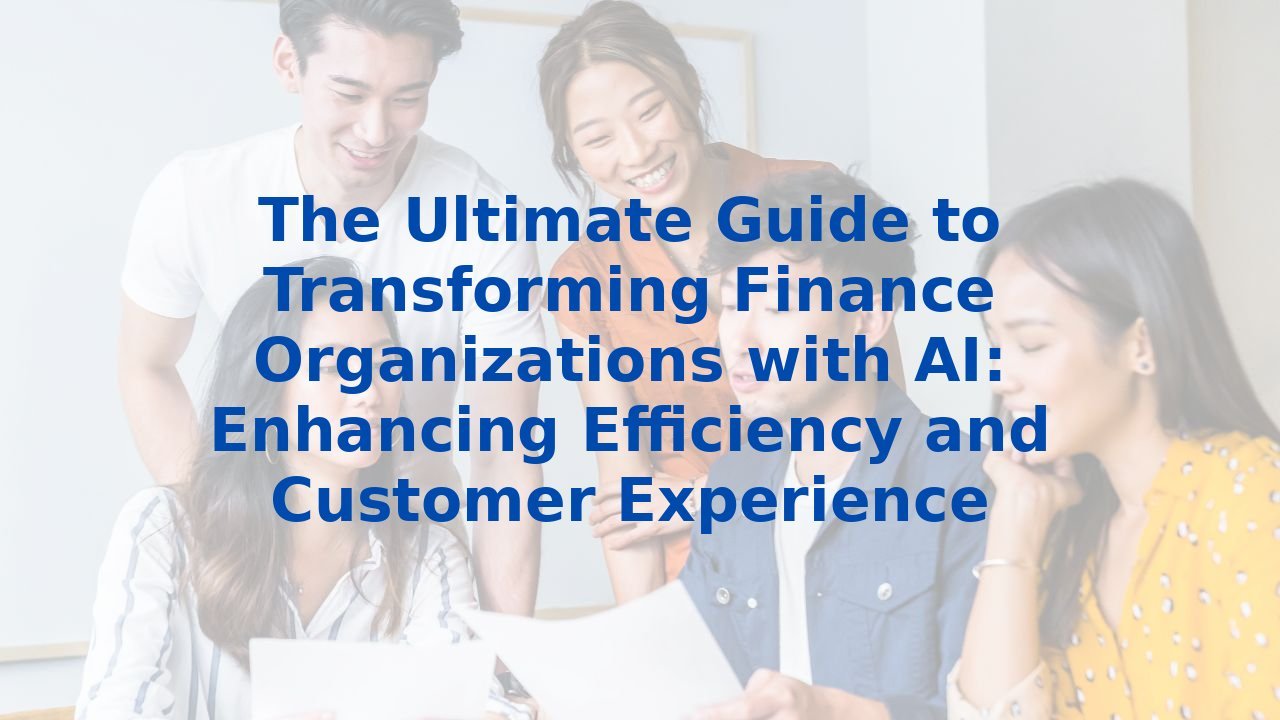The Ultimate Guide to Transforming Finance Organizations with AI: Enhancing Efficiency and Customer Experience
The Ultimate Guide to Transforming Finance Organizations with AI: Enhancing Efficiency and Customer Experience
In the high-stakes world of finance, organizations are constantly challenged to improve efficiency while meeting ever-evolving customer demands. Enter artificial intelligence (AI)—a game-changing technology that not only enhances operational capabilities but also redefines customer interaction. In this guide, we will explore how AI can be integrated into key business processes, illuminating the myriad benefits it brings to finance organizations.
Operational Efficiency
At the core of AI's transformative power lies its capability to streamline operations. Consider the mundane but critical processes like document handling and data entry. By automating these repetitive tasks, AI minimizes human error, thereby enhancing data accuracy and integrity. Financial organizations can reallocate their human capital from labor-intensive tasks to strategic roles that drive the business forward. For instance, AI can efficiently manage payroll, financial reporting, and transaction processing, which traditionally occupy significant man-hours. This shift not only bolsters operational efficiency but also empowers employees to engage in higher-value activities that require human ingenuity.
Improved Customer Experience
In today's consumer-driven market, the way organizations interact with their customers often determines their success. AI facilitates personalized customer engagements through natural language processing (NLP) technologies such as chatbots and virtual assistants. These tools offer real-time assistance, making it possible to address customer inquiries swiftly and around the clock. Furthermore, AI can analyze consumer data to provide tailored financial insights and recommendations, turning a standard service interaction into a personalized experience that builds loyalty and satisfaction. In a world where time is money, remote access and instant information resonate deeply with clients seeking convenience and reliability.
Competitive Advantage through Insight
The real magic happens when organizations leverage machine learning algorithms to gain insights into market dynamics, risk factors, and customer behaviors. This capability enables financial firms to make informed decisions with unprecedented speed. With AI-driven analytics, organizations can pivot adeptly in response to market changes, staying one step ahead of competitors. The ability to uncover valuable intelligence about trends and consumer habits allows finance companies to seize opportunities and mitigate risks before they materialize.
Accuracy in Risk Management
One of the monumental advantages AI brings to finance is its proficiency in analyzing complex datasets. With its capacity to identify patterns that may elude human analysts, AI enhances risk management strategies. It predicts potential investment risks, detects fraud, and evaluates portfolio performance with remarkable accuracy. By processing and synthesizing vast amounts of information quickly, AI equips financial institutions to make data-supported decisions promptly, supporting essential functions such as trading, compliance, and risk assessment. This holistic approach to risk management fosters a more resilient organization.
Strategic Decision-Making
AI-powered predictive analytics can rewrite the script on how financial organizations forecast and strategize. Imagine possessing the ability to anticipate market trends, consumer behavior, and emerging risks. Financial institutions can optimize investment strategies and revenue forecasts, enabling them to adjust proactively to marketplace shifts. With these insights, the pathway for growth and resilience becomes markedly clearer, allowing companies to capitalize on favorable opportunities while shielding themselves against potential setbacks.
The Human Element: Training Employees for AI
While the benefits of AI are undeniable, success hinges on an organization's readiness to embrace this technology holistically. Reviewing the capabilities and limitations of AI systems is imperative for financial professionals. Upskilling employees not only ensures they can work effectively alongside AI tools but also fosters collaboration that amplifies both human and machine output. A proficient workforce can build and refine processes that optimize performance, ensuring that the benefits of AI aren’t just absorbed by technology but translated into tangible business results. Organizations should consider investing in comprehensive training programs to nurture these essential skills and build a harmonious work environment.
The Future of AI in Finance
The trajectory of AI in finance is poised for extraordinary growth. As technological advancements continue to unfold, finance organizations will deploy AI-driven solutions for enhanced customer experiences, more precise risk assessments, and refined operational algorithms. By integrating these systems, firms can automate routine functions, driving both efficiency and profitability. Furthermore, AI’s predictive capabilities will unlock new opportunities and aid in proactive risk management, allowing financial institutions to remain at the vanguard of innovation while serving their clients' varied needs.
In summary, the integration of AI is revolutionizing the finance industry by enhancing efficiency, improving customer interactions, and providing vital competitive advantages. By automating operational tasks, leveraging vast data insights, and empowering strategic decision-making, AI is reshaping the financial landscape. As organizations look toward future success, investing in employee training will be crucial—positioning companies to fully harness AI's potential while fostering a collaborative environment that elevates the financial services industry.



